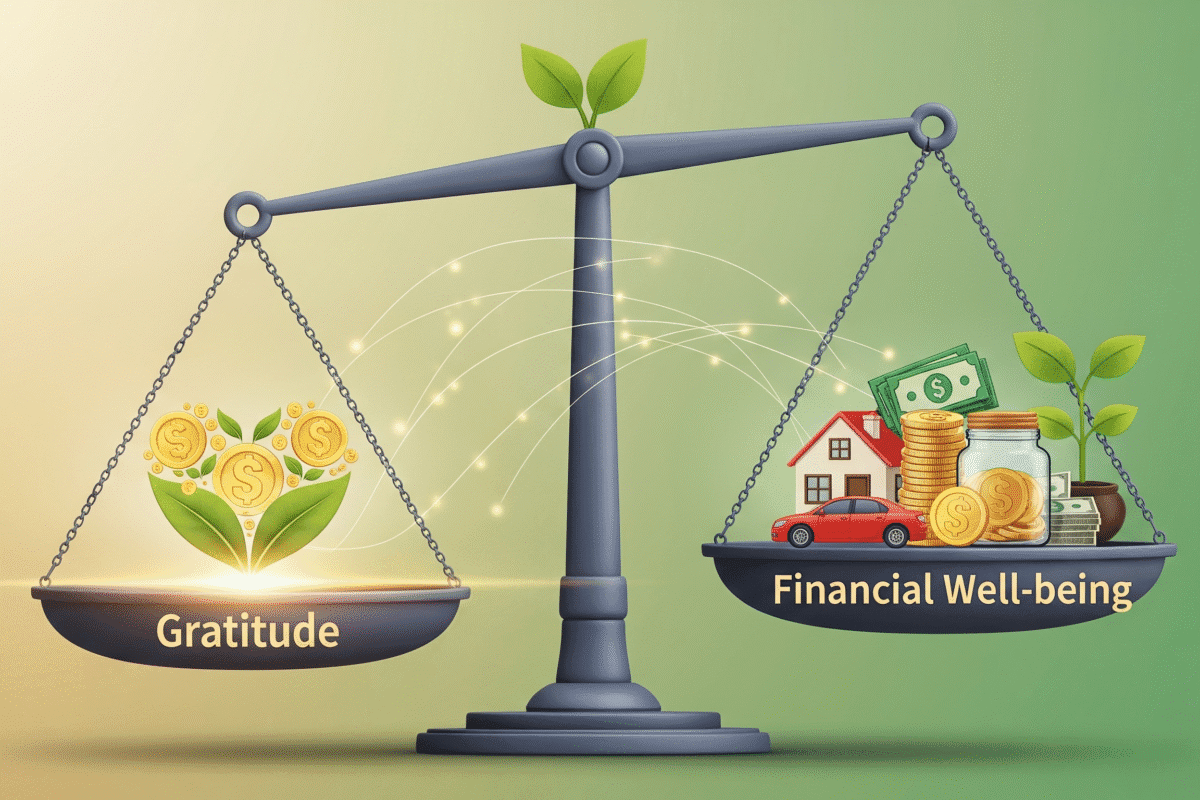The Role of Gratitude in Personal Finance:
The Role of Gratitude in Personal Finance:
It may seem strange to discuss gratitude in the fast-paced world of personal finance, where budgeting, investing, and saving make headlines. However, a growing corpus of studies and practical applications demonstrate that being grateful can improve your financial well-being in addition to your emotional health.
This article examines the psychology of appreciative financial habits, the role that gratitude plays in money management, and the ways in which people might use gratitude to attain long-term financial stability.
HSBC Cashback Credit Card 2025 – Benefits, Rewards & How to Apply?

“Thank You” Is Not the Only Expression of Gratitude
Fundamentally, thankfulness is the ability to acknowledge and value life’s good things, especially in the face of adversity. Gratitude in personal finance refers to appreciating what you now have, appreciating your resources, and making thoughtful financial decisions.
Gratitude helps people change their perspective from concentrating only on what is lacking—a larger home, a more modern vehicle, or the newest technology—to focusing on what is already enough. This change enhances decision-making, boosts financial resilience, and decreases impulsive spending.
The Psychology of Gratitude in Finance
Researchers in behavioral psychology and economics have long studied the connection between mindset and money habits. Gratitude stands out as a powerful emotional tool because it:
- Reduces Emotional Spending – When you feel content with what you have, you are less likely to spend money on unnecessary purchases to “fill a void.”
- Increases Patience – Gratitude fosters long-term thinking, which supports saving and investing.
- Boosts Resilience – Financial setbacks, such as job loss or debt, feel less overwhelming when viewed through a grateful mindset.
- Strengthens Relationships – Gratitude improves trust and generosity in personal and professional financial dealings.
A Balanced Approach to Budgeting and Gratitude
Gratitude reframes budgeting as a tool for empowerment, despite the fact that it is frequently seen as restricting. Gratitude emphasizes the opportunity that money offers rather than the sacrifices:
- On-time bill payment as a measure of financial stability
- Making enough money to pay for necessities and groceries
- Having the ability to save money for retirement or emergencies
For instance:
Think about two people who earn the same amount each month. Budgeting is seen as a form of punishment by those who feel deprived all the time. The other practices gratitude, appreciating that budgeting allows them to meet goals and avoid debt. Over time, the grateful individual is more consistent with their budget, building better long-term wealth.
Gratitude vs. Lifestyle Inflation
One of the biggest threats to financial stability is lifestyle inflation—spending more as income increases. Gratitude acts as a natural antidote.
- Instead of chasing the newest luxury item, grateful individuals enjoy what they already own.
- Instead of upgrading cars every two years, gratitude helps people value reliability and function over status.
- Instead of comparing themselves to peers, they focus on their unique financial journey.
This doesn’t mean people with gratitude avoid nice things altogether. Rather, they make intentional choices—spending on things that truly bring value and joy.
Using Gratitude to Manage Debt
Although debt can seem overwhelming, thankfulness offers a new outlook:
- Appreciation for credit availability: Many individuals around the world do not have access to loans that can be used for emergencies or education.
- Appreciation for advancement: Honoring minor victories, like saving $100, increases drive.
- Focusing on empowerment rather than shame – Gratitude-driven people view debt payback as a path to personal development rather than a place of stagnation.
According to studies, people who use gratitude notebooks to chronicle their debt payments are more likely to stick with their repayment arrangements over time.
The Benefits of Gratitude for Investing and Saving
Gratitude facilitates delayed gratification, which is often necessary for saving money. You feel less pressure to spend every penny right away when you’re grateful for what you have.
Gratitude’s Real-World Impact on Saving:
- Emergency Funds: The sense of security that comes with having money is strengthened by gratitude.
- Retirement Savings: Gratitude reframes retirement payments as a gift to your future self rather than as lost income.
- Investing Discipline: Because they value long-term growth, grateful investors are less sensitive to market fluctuations.
Gratitude and Generosity
One of the most overlooked aspects of financial gratitude is its connection to generosity. People who regularly practice gratitude are more likely to give—whether through charitable donations, helping family, or community contributions.
Generosity doesn’t just benefit recipients. It also:
- Strengthens community ties
- Creates a sense of abundance instead of scarcity
- Improves mental well-being, which in turn supports better money habits
Daily Gratitude Practices for Financial Wellness
Gratitude is not a one-time activity—it’s a habit. Below are practical ways to incorporate gratitude into your financial life:
- Gratitude Journaling – Write down three things you’re financially grateful for each week.
- Mindful Spending – Before purchasing, pause to ask: “Am I buying this out of gratitude or dissatisfaction?”
- Celebrate Small Wins – Whether saving $20 or paying off a credit card, acknowledge progress.
- Gratitude Letters – Thank mentors, employers, or family members who contributed to your financial journey.
- Perspective Shifts – Reframe bills as signs of stability (e.g., paying the electricity bill means having power at home).
In times of financial crisis, gratitude
Resilience is put to the test by financial difficulties, ranging from recessions to unforeseen medical costs. Gratitude lessens the impact of adversity but does not eliminate it.
For instance:
- Gratitude during a job loss may center on connections of support or transferable skills.
- Being thankful for long-term investing prospects helps you stay patient during market downturns.
- Gratitude emphasizes the availability of financial resources and education throughout difficult debt payback times.
This mindset allows people to recover faster and make wiser decisions under pressure.
The Role of Gratitude in Family and Money
Families who practice gratitude often raise children with healthier money habits. Simple traditions—like discussing one thing the family is grateful for during dinner—can:
- Teach kids the value of money without materialism
- Encourage shared financial goals
- Reduce conflicts about spending priorities
Couples, too, benefit from gratitude in finance. Expressing thankfulness for a partner’s financial contribution (whether big or small) builds trust and cooperation.
Gratitude and Long-Term Wealth Building
Wealth isn’t just about numbers—it’s also about mindset. Gratitude creates sustainable wealth by:
- Encouraging patience in investments
- Preventing overspending driven by comparison
- Strengthening financial confidence by focusing on abundance rather than scarcity
- Promoting generosity, which fosters community wealth
When paired with practical tools like budgeting, debt management, and financial planning, gratitude becomes a silent force multiplier for wealth.
Gratitude as a Financial Strategy: A Conclusion
Income, expenses, assets, and liabilities are the figures that are frequently used to frame personal finance. But behind the numbers lies human behavior, driven by emotions and mindset.
Gratitude transforms the financial journey. It helps people spend wisely, save consistently, manage debt positively, and invest with patience. More importantly, gratitude creates a sense of abundance that no dollar amount can replace.
In an age of consumerism and financial anxiety, gratitude stands as one of the most underrated tools for building long-term financial success.
Decentralized Finance (DeFi): Opportunities, Risks, and the Future of Global Finance
Decentralized Finance (DeFi): Opportunities, Risks, and the Future of Global Finance
